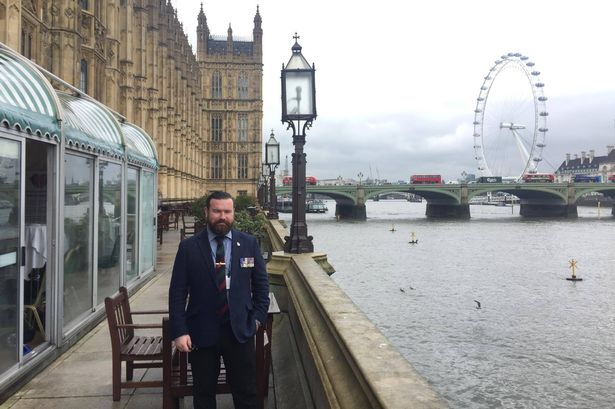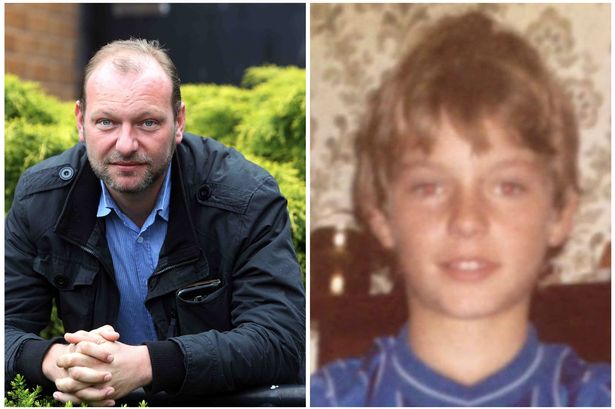Brave former soldier who survived Taliban bombing and Westminster attack talks about coping with PTSD
A former soldier who was blown up by the Taliban and trapped in the Houses of Parliament during the Westminster terror attack has spoken out about mental health and his battle with Post Traumatic Stress Disorder.
Infantry man, Stewart Harris saw friends killed and came close to dying himself while serving with the Welsh Guards in Afghanistan.
Three of his comrades were shot dead and during his last tour of the country, a roadside bomb hurled his vehicle into a ditch, leaving him with a detached retina, brain damage and deafness in one ear.
Westminster Terror Attack
When he left the Armed Forces, he was invited to the Houses of Parliament to talk about the ABF Soldier’s Charity in a bid to gain support for serving soldiers and veterans from MPs, when everyone was put on lockdown after five people were killed by Khalid Masood in the attack on London on March 22.
But now the father-of-two from Rhyl has been named Sports Wales’ May Legend after finding taking up golf had a positive impact on his mental health.

(Photo: Stewart Harris)
Speaking during Mental Health Awareness Week, Stewart, who is now an ambassador for the sport, said he uses his personal story and his battle with PTSD to inspire and change the lives of others.
He said: “I served 13 years with the 1st Battalion Welsh Guards.
“I did tours in places like Kosovo, Bosnia, Northern Ireland, Iraq and later Afghanistan.
“While in Afghanistan, my vehicle was hit by an Improvised Explosive Device (IED).
“Everything went completely dark.”
Mental health issues
The next thing Stewart remembers is waking up in hospital and being told he had damaged the frontal, temporal and optical lobes in his brain.
He added: “As I got better physically, my mental health started to take a dip to the point where I was struggling with day-to-day tasks such as putting my shoes on.
“I had nightmares…sometimes I’d wake up and I would’ve wet myself, I was so scared.

“One day I just walked out to the beach and thought I’m just going to swim out there until I don’t have the strength to swim back.
“As I waded into the water, I had a vision of my girls getting bullied at school so I turned around, went back to my house, told my wife, she called 999 and I was placed in a mental health unit.”
Learning golf
It was then that Stewart was introduced to a Falklands veteran.
“He took me to a driving range and we started hitting a few balls.
“I’ve had countless amounts of therapy sessions, medicines, but nothing as came close as what it was like to be outdoors in the fresh air and socialising.
“Golf really helped me through some tough times.
“It’s given me everything and opened so many doors, it’s had a crazy big impact on my life.”

(Photo: Sports Wales)
Hannah McCallister of Golf Union Wales said: “Stewart is an inspiring character with a story to tell.
“When he starts talking about how golf has helped him after some serious injuries and tough times serving in the army in Afghanistan, everyone listens.
“Stewart is an outstanding role model and he is having a great impact.
“His work in promoting sport, his honesty in sharing his personal traumas and his infectious enthusiasm, make him a true Sport Legend.”
Forces for Change
On Thursday, mental health charity Hafal will launch Forces for Change aimed at armed and blue light veterans, as part of a Wales-wide campaign.
Their goal is to support others and help them access the services they need to recover.
Minister for Social Services and Public Health, Rebecca Evans said: “We owe our veterans a huge debt of gratitude for their service.
“That is why we are committed to ensuring the appropriate care and support is available to those who need it.
“We know that some veterans are not accessing this help because they perceive a stigma around mental health.
“This campaign will help tackle that stigma, bring the issue into the public forum, and highlight the services available.”
The campaign also has the backing of the Royal British Legion and Veterans NHS Wales.
Frank Kitt, a panel member and former police officer with experience of anxiety and depression, added: “Forces for Change will help our fellow veterans to overcome these problems by saying to them, ‘It’s OK that you feel this way, and you are not alone.'”
Have your say on this story using the comments section below





